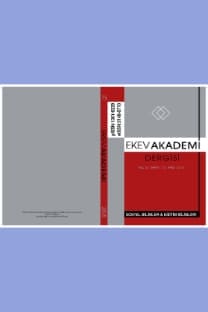EXAMINING THE EDUCATION POLICIES IN POLITICAL PARTIES’ 24 JUNE 2018 ELECTION MANIFESTOS
Political Parties, Election Manifestos, Education Policy Turkish Education System, Teacher, Student,
___
- Akça, Y., Şahan, G. and Tural, A., (2017). Türkiye’nin kalkınma planlarında eğitim politikalarının değerlendirilmesi, International Journal of Cultural and Social Studies (IntJCSS), 3, 394-403, DOI: 10.14486/IntJSCS505
- AKP, (2018). Cumhurbaşkanlığı seçimleri ve genel seçimler Beyannamesi, Retrieved October 18, 2018, from http://www.akparti.org.tr/site/dosya/59647
- Atmış, E., (2008). 2007 Genelseçim bildirgeleri çerçevesinde siyasi partiler ve ormancılık ilişkileri, Bartın Orman Fakültesi Dergisi, 10 (14), 33-42.
- Berber, Ş., (2001). Türkiye’deki siyasi partiler ve eğitim politikaları, Selçuk Üniversitesi Sosyal Bilimler Meslek Yüksekokulu Dergisi, 4 (2), 1-34.
- CHP, (2018). Seçim bildirgesi, Retrieved October 18, 2018, from http://secim2018.chp. org.tr/files/CHP-SecimBildirgesi-2018-icerik.pdf?v=3
- Davut, D., (2008). Siyaset bilimi, (4. Baskı), İstanbul: Beta Yayıncılık.
- HDP, (2018), “Seçim bildirgesi”, Retrieved October 18, 2018, from https://hdp.org.tr/ drive.google.com/file/d/1E8L6KtBHbuc-tB4TxNM3YURSWdZ34Zj7/view
- Kapani, M., (2006). Politika bilimine giriş, (18. Baskı), Ankara: Bilgi Yayınevi.
- İyi Parti, (2018). Milletimizle sözleşme, Retrieved October 18, 2018, from https://iyiparti. org.tr/assets/pdf/secim_beyani.pdf
- Kösterelioğlu, İ. and Bayar, A., (2014). Türk eğitim sisteminin sorunlarına ilişkin güncel bir değerlendirme, The Journal of Academic Social Science Studies, 25 (1), 177- 187.
- MHP, (2018). 24 Haziran 2018 Milletvekili genel seçimi seçim beyannamesi, Retrieved October 18, 2018, from https://www.mhp.org.tr/usr_img/_mhp2007/kitaplar/ 24haziran2018_secim_beyannamesi_tam_web.pdf
- Özyılmaz, Ö., (2017). Türk milli eğitim sisteminin sorunları ve çözüm arayışları, Pegem Akademi, Ankara.
- Saadet Partisi, (2018). Türkiye vizyonu seçim beyannamesi, Retrieved October 18, 2018, from https://www.saadet.org.tr/dosyalar/1528900020beianname.pdf
- Sarıbaş, S. and Babadağ, G., (2015). Temel eğitimin temel sorunları, Anadolu Eğitim Liderliği ve Öğretim Dergisi, 3 (1), 18-34.
- Uygun, S., (2013), Türk eğitim sistemi sorunları, Nobel Yayınları, Ankara.
- Vatan Partisi, (2018). Seçim bildirgesi, Retrieved October 18, 2018, from http:// vatanpartisi.org.tr/genel-merkez/temel-belgeler/vatan-partisi-secim-bildirgesi- 26769
- Yıldırım, A. and Şimşek, H., (2008). Sosyal bilimlerde nitel araştırma yöntemleri, Seçkin Yayıncılık, Ankara.
- ISSN: 1301-6229
- Yayın Aralığı: 4
- Başlangıç: 1996
- Yayıncı: ERZURUM KÜLTÜR VE EĞİTİM VAKFI
FAİZ; ENFLASYON, DÖVİZ KURU VE BÜYÜME İLİŞKİSİ
ÖYKÜCÜ YUSUF ATILGAN’IN PRAGMATİK SAPLANTILARI
ESKİ TÜRK EDEBİYATI BAĞLAMINDA İKİ MÜELLİF BİR İDEAL İNSAN: KUTADGU BİLİG VE DİVANÜ LÜGATİ’T-TÜRK
LEHCETÜ’L-LÜGAT’TE TIBBİ İSİMLER I (A – D)
SANAT EĞİTİMİ ALAN VE ALMAYAN ERGENLERİN ÖZ-YETERLİKLERİNİN İNCELENMESİ
YABANCI DİL OLARAK TÜRKÇENİN ÖĞRETİMİNDE ONOMATOPİLER (YANSIMALAR)
ORTAOKUL ÖĞRENCİLERİNİN TOPRAK EROZYONU KONUSUNDAKİ GÖRÜŞLERİNİN BELİRLENMESİ “AĞRI İLİ ÖRNEĞİ
PINAR URAL KELEŞ, TÜLAY DİZİKISA
OSMANLI TÜRKÇESİ DERSİNE YÖNELİK TUTUM ÖLÇEĞİ: GEÇERLİK VE GÜVENİRLİK ÇALIŞMASI
